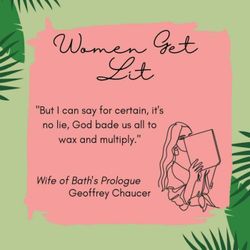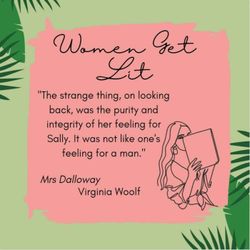Share

Women Get Lit
Gothic, Sexuality and Violence: A Male Academic's Perspective
Today's featured guest is brilliant academic, Sam Halliday, from Queen Mary University of London.
Sam and I dissect the representation of violence against women and violence perpetrated by women in 18th-century novels. Our discussions will revolve around two texts, both authored by women: Ann Radcliffe's "The Mysteries of Udolpho" and Charlotte Dacre's "Zofloya." We'll explore the themes of violence, sexuality, power, and agency within these Gothic texts.
Sam guides us through the compelling depiction of violent, masculine women in the novel, challenging traditional notions of femininity. We discuss the implications of these characters and their impact on our understanding of gender roles and expectations.
Trigger Warning: this episode does mention and discuss sexual assault.
Follow me on Instagram!
@womengetlit
@apolishgalsthoughts
More episodes
View all episodes

7. Talking Through the Mind: A Psychologist's Perspective
34:54||Season 1, Ep. 7Welcome to the last episode of Women Get Lit. And today's featuring guest psychologist Justine.I wish to end this series with a reflection on the most important themes and discussions through the lens of a professional psychologist. Follow me on Instagram! @womengetlit@apolishgalsthoughts
6. Female Solidarity, Queer Reading of Nella Larsen's Passing
31:41||Season 1, Ep. 6Today's featured guest is brilliant Professor Susan Rudy! Professor Rudy's expertise includes contemporary and experimental poetry, queer feminist theory, and women's experimental writing. Get ready for a captivating journey into the world of literature, gender, and activism.We delve into Professor Rudy's most recent work, "Gender's Ontoformativity, or Refusing to be Spat Out of Reality." We explore how her work delves into the writings of lesbian poet Nicole Brossard and its implications for our understanding of gender and literature.Later we discuss Nella Larsen's "Passing", delving into its themes of race, identity, and the complex intersections of gender and sexuality.Professor Rudy shares her perspectives and experiences, shedding light on the ongoing struggle for inclusivity and equality. We'll explore how these movements have evolved and continue to shape our understanding of gender and identity.Follow me on Instagram! @womengetlit@apolishgalsthoughts
5. Female Gossip, Chaucer and The Wife of Bath: A Male Academic's Perspective
37:51||Season 1, Ep. 5Today's featuring guest is Joel Grossman, a lecturer in Medieval and Renaissance Literature at the University of Surrey. Our literary journey takes us deep into the heart of Chaucer's "The Canterbury Tales," with a keen focus on the captivating Wife of Bath.We discuss the Wife of Bath's bold and modern discourse on love, marriage, and the role of men in society. Join us as we explore the shockwaves she sends through her audience with her unconventional views, shedding light on the complexities of her character and the society she inhabited.We explore the challenges and nuances of how a male author like Chaucer portrays the female perspective. Joel brings his expertise to the forefront as we discuss the inherent problems and potential biases that arise when men attempt to authentically write from a female point of view.Follow me on Instagram! @womengetlit@apolishgalsthoughts
3. Utopian Female Bliss, Mrs Dalloway and Barbie
32:54||Season 1, Ep. 3In today's episode of Dagmara returns to continue our discussion of "Mrs Dalloway".We draw on an intriguing comparison of Woolf's masterpiece and the iconic Barbie movie, uncovering unexpected connections between these seemingly disparate worlds.At the center of the discussion, we explore the underlying exploration of male violence. We draw on the complex dynamics of Clarissa's relationships with Peter Walsh and Richard Dalloway, shedding light on the subtle but powerful critique of male domination, manipulation and the societal expectations surrounding marriage.Lastly, we delve into how reality often differs from the idyllic deception of female solidarity and connection that is found in the Barbie narrative or unharmed relation between Clarissa and Sally.Follow me on Instagram! @womengetlit@apolishgalsthoughts
2. Creativity, Academia and Mrs Dalloway
39:10||Season 1, Ep. 2Today's featured guest is my friend and university student Dagmara, who studies French at Oxford University.In today's episode Daga and I discuss our study of Virginia Woolf's "Mrs Dalloway" during our A-levels. We take a personal turn and reflect on our time in an all girls- school. How it shaped our understanding of women, men, violence and society. We'll share our insights into Woolf's pursuit of a female space for passion and creativity within the novel. Prepare to be inspired as we unravel the layers of this literary gem!Lastly, Daga will explore her relationship with creativity and how she expresses it within her tight, academic setting.Follow me on Instagram! @womengetlit@apolishgalsthoughts
1. Women, Gender Roles and Jane Eyre
22:33||Season 1, Ep. 1In the first episode of Women Get Lit, I begin the series with my friend and university student Amalie.Amalie studies English with Creative Writing in London. She is an incredibly talented writer and is deeply fascinated with Modernist and Nordic literature.In today's episode we discuss Charlotte Bronte's "Jane Eyre", zooming into the complicated power dynamic between Jane and Mr Rochester. We delve into Bronte's representation of marriage and what position it places women in (within both literature, society, and our own understanding of writing complex characters). We debate who and what the mad woman in the attack, Bertha, represents and how she fits into our understanding of women.Amalie also shares her experience as a writer, delving into the depths of writing process, style and restrictions.Follow me on Instagram! @womengetlit@apolishgalsthoughts